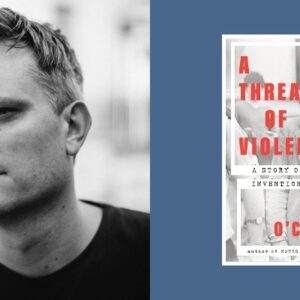I was a kid playing Atari with my best friend when she informed me, as she sent her frog darting through traffic, that Nostradamus had predicted the world would end in nookuler destruction in August of that year. The exact date she named happened to be my birthday. Since Nostradamus lived hundreds of years ago and didn’t even know what nookuler was, she continued confidently, he must have had special powers and his predictions were therefore true. It was the early eighties and we had no internet, so I accepted her logic and spent the remaining weeks of summer assuming I would die before the leaves fell.
If you were born in the 1970s, like me, or the sixties or the fifties, the Cold War was the backdrop of life, like wallpaper. It had no beginning and no end. It just was. You trundled to school each day under partly cloudy skies and a chance of nuclear annihilation, and when you went to the bookstore or the movie theater you found spy novels, spy movies that pitted Us against Them—the Soviet Union. In these stories, men chased each other around the world while some bomb ticked somewhere, some web of loyalties required untangling. Their manly brows furrowed under the weight of so much responsibility. Their wives worried cluelessly at home. The hot girl in the black sequined dress with the cleavage turned out to be a honey trap.
It wasn’t always this way. Sure, if you turn to the spy novels of John le Carré or Graham Greene, written back when the Cold War was in its early stages and the audacious betrayals of the Cambridge Five were still raw, you’ll find plenty of spycraft and plot twists, nagging wives and bimbos. But an atmosphere of cynicism darkens all that derring-do. Unlike the Second World War, this is not a straightforward clash of armies; this is subterfuge, screwups, betrayals. The stakes are ambiguous. There is no clear battle, no victory in sight. The proxy wars are quagmires, both physically and morally. The psychological cost is shattering. It was Fleming who figured out that beating the Russkis could be fun and profitable, and by the time the Eighties rolled along, the moral case against communism was clearer. Everyone knew about the gulags, the Stasi, the lines for food. If we sometimes had to fight dirty, so what? They fought dirtier.
When the Berlin Wall fell, we stared at our television screens in disbelief. Was it over? Really over? Just like that? I was in Budapest the week the last Soviet tanks rolled out of Hungary, and Frank Zappa held a concert in the park near the castle to celebrate. Budapest was shabby and cheap and full of hope. The queues at McDonalds were long and polite, the counter staff beamed. Peace at last. Roll credits. Now what?
For the next couple of decades, we forgot about the Cold War. We tore off the wallpaper and repainted in coastal gray. Our spy novels and spy movies found new opponents to chase around the world—Islamic terrorists, shadowy octopus corporations, enemies within. Then we started worrying about Russia again (history never ends, it just repeats itself in a different key) and we were reminded that Putin began his career in the KGB and we thought, huh.
Maybe it’s time to revisit the Cold War.
But this time it’s different. We are looking through a window, not into a mirror. We see things differently. In the first place, we have lived a little since then. We’ve experienced acts of terrorism, international and domestic. We have seen buildings blown up, financial markets blown up, kids blown up. We have become obsessed with true crime, killers next door, killers in our own homes.
In the second place, we’re starting to learn just how much we didn’t know we didn’t know, at the time. People have died and files have been declassified. It turns out that if you were a foreign correspondent for Time magazine, say, or maybe Life (remember Life magazine?) you were probably collecting intelligence on the side. When I was on the road speaking about Our Woman in Moscow, plenty of people came up to me afterward and said some version of, I recently found out my dad was working for the CIA in Vienna, how about that? Or the nice lady who came up to me and told me indignantly that she had been a CIA analyst at Langley and my final scene could never have happened. (And Bond could?)
Our parents, it turns out, led double lives. Our neighbors might have been KGB illegals, who knows? That perfectly ordinary guy at the FBI might have been the most catastrophic double agent in the bureau’s history. Or that husband and wife who moved into the house down the street—were they secretly operating a radio for the Soviet Union, transmitting coded information to Moscow Centre? The point is, you never knew.
And our memory has holes. The kids know that Hitler was a monster; they don’t know Stalin was just as monstrous. If you visit Berlin now, you can’t tell where the wall snaked from north to south, separating neighborhood and families, and the places where people were shot dead trying to flee from East to West. My husband worked for the German state privatization agency just after reunification, in the old Luftwaffe headquarters that sat in the former Soviet sector, not far from the Brandenburg Gate. He remembers crumbling infrastructure and a wary, uneasy population, worn down by decades of life in a police state. Returning there a few years ago, he was stunned. Everything rebuilt. Shops and commerce where cheap, dreary apartments housing multiple families had once filled the holes left by Allied bombs. People no longer looking over their shoulders.
To revisit the Cold War is to step off the moral high ground of Second World War fiction onto something boggier. It’s a land that grows rich stories, packed with psychological drama—think of The Americans, the spy thriller crossed with domestic suspense. As we dig deeper into the historical record—much of it now declassified—who knows what we’ll unearth?
But at least we know my friend was wrong about Nostradamus—the nukes never fell, on my birthday or afterward. Like that damn computer frog, darting its way through traffic and across the crocodile-infested river to safety.
***


















